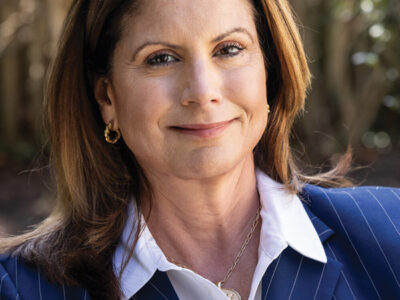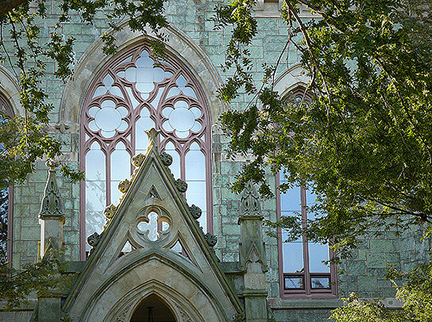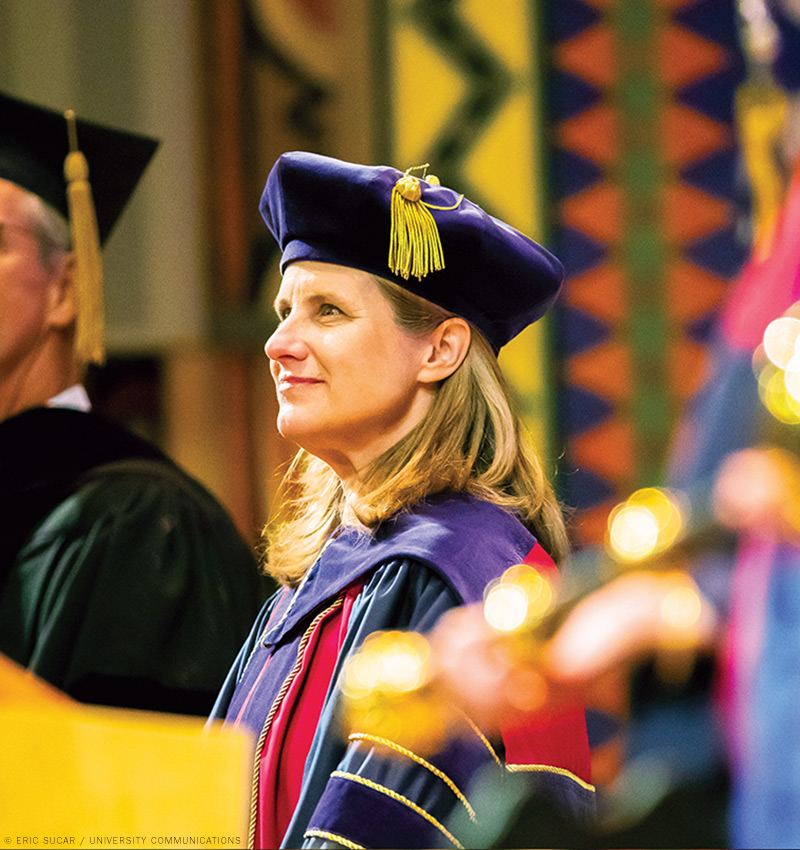
On her inauguration day as the University’s ninth president, Liz Magill shared a vision of even greater impact and influence for Penn’s next chapter, picnicked on Shoemaker Green with members of the Penn community and some favorite musicians, and hosted a wide-ranging conversation with Supreme Court Justice Elena Kagan at a critical time for the institution.
By the Gazette Editors
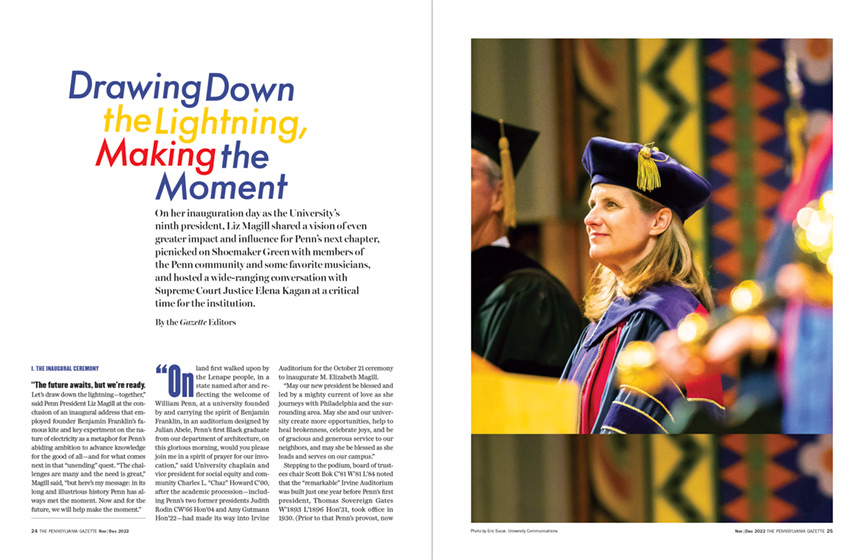
I. The Inaugural Ceremony
“The future awaits, but we’re ready. Let’s draw down the lightning—together,” said Penn President Liz Magill at the conclusion of an inaugural address that employed founder Benjamin Franklin’s famous kite and key experiment on the nature of electricity as a metaphor for Penn’s abiding ambition to advance knowledge for the good of all—and for what comes next in that “unending” quest. “The challenges are many and the need is great,” Magill said, “but here’s my message: in its long and illustrious history Penn has always met the moment. Now and for the future, we will help make the moment.”
“On land first walked upon by the Lenape people, in a state named after and reflecting the welcome of William Penn, at a university founded by and carrying the spirit of Benjamin Franklin, in an auditorium designed by Julian Abele, Penn’s first Black graduate from our department of architecture, on this glorious morning, would you please join me in a spirit of prayer for our invocation,” said University chaplain and vice president for social equity and community Charles L. “Chaz” Howard C’00, after the academic procession—including Penn’s two former presidents Judith Rodin CW’66 Hon’04 and Amy Gutmann Hon’22—had made its way into Irvine Auditorium for the October 21 ceremony to inaugurate M. Elizabeth Magill.
“May our new president be blessed and led by a mighty current of love as she journeys with Philadelphia and the surrounding area. May she and our university create more opportunities, help to heal brokenness, celebrate joys, and be of gracious and generous service to our neighbors, and may she be blessed as she leads and serves on our campus.”
Stepping to the podium, board of trustees chair Scott Bok C’81 W’81 L’84 noted that the “remarkable” Irvine Auditorium was built just one year before Penn’s first president, Thomas Sovereign Gates W1893 L1896 Hon’31, took office in 1930. (Prior to that Penn’s provost, now chief academic officer, also held executive authority.)
Bok then introduced the opening speakers: Vivian Gadsden, the William T. Carter Professor of Child Development and Education in Penn’s Graduate School of Education and chair of the Faculty Senate, and Penn Alumni President Ann Reese CW’74—there to welcome Magill on behalf of the faculty and alumni, respectively—and the poet for the occasion, Erica Hunt, the Bonderman Visiting Associate Professor of the Practice of Literary Arts at Brown University.
Gadsden noted that Magill had “covered much of the United States over the years” in her path from childhood in North Dakota to college at Yale, law school at the University of Virginia, and academic posts at UVA and Stanford. “No doubt your experiences have prepared you for this moment with the insights, energy, and sense of power to work with a faculty with our own insights, energy, and senses of power,” she said. “We know you will lead with a steady hand, uplifting Penn’s faculty and recognizing our different cultural, ethnic, racial, and gendered histories, our indefatigable labor and dedication to inquiry, our dauntless independence yet collaborative spirit, and our eye and effort toward social purpose, equity, and justice.”
Reese, vice chair of the trustees, whose term as Penn Alumni president concludes at the end of this year, called it a “very special privilege” to welcome Magill on behalf of the University’s more than 300,000 alumni worldwide, “including 61 from the great state of North Dakota.”
She described the alumni as “a loyal red and blue contingent” with a “special affinity” for Penn’s “enduring tradition of academic excellence, our commitment to diversity and accessibility, and our shared and unshakeable worldview that Penn can make the world a better place,” first articulated by Benjamin Franklin in his 1749 proposal for the academy that would become the University.
“Though Penn has come a long way since Franklin’s time, we remain true to his mission and I know you share these ideals,” she added. “As alumni, we’re grateful that you have accepted the important responsibility of Penn president, we know that you recognize the value of a strong and energetic alumni base, and we cannot wait to work with you to help move Penn forward for current students and future generations alike.”
Bracketed by a musical performance and dance medley by students, Hunt read her poem composed for the occasion, “Dear Neighbor,” which included a call to “meet this moment with virtuous impatience”—a formulation Magill had used at her election by the trustees last March and to which she would return in the course of the ceremony.
The main speaker preceding Magill was James E. Ryan, president of the University of Virginia, where Magill was provost before coming to Penn. The two are also longtime former colleagues at UVA’s law school, and close friends—as indicated by Ryan’s opening anecdote about how Magill talked him down from sending a letter he had drafted (“with a heavy dose of pedantry and a splash of hyperbole”) denouncing the “gross injustice and rank hypocrisy” of a policy change at his children’s preschool. Magill counseled that he call or visit the school instead, which he did, and the problem was resolved.
“I raise this somewhat frivolous story because it captures much of what I admire and love about Liz Magill,” he continued. “First and foremost, she is a fiercely loyal friend. When she decides she’s on your side, she is on your side. You become like family to her. Your hopes become her hopes, your challenges her challenges. She makes time to help when you ask and even when you don’t,” he said. “Her response to my letter was not driven by a desire to point out how ridiculous it was—and it was ridiculous. It was driven instead by a desire to prevent me from embarrassing myself and from making the situation worse. She was at once sticking up for me and protecting me. I can tell you that the entire Penn community now falls in the category of Friend of Liz, and you will not have a better or more determined champion.”
Praising Magill as both empathetic and tough, he called her “a natural leader,” but added that that description fell short. “It misses the fact that few people, if any, work harder than Liz Magill. She’s an effective leader because she works hard at it. I saw this time and again when she was in the provost’s office at UVA, but especially during the COVID crisis,” he said.
At the start of his remarks, Ryan had called Magill the first “Cavalier Quaker,” referring to UVA’s mascot. He went on to draw connections between the schools’ famous founders. “Franklin was a trusted friend and mentor to Jefferson, who succeeded Franklin as ambassador to France and called the experience of following Franklin a lesson in humility,” he said. “And while Jefferson was the primary author of the Declaration of Independence, Franklin served as editor, supplying the critical and immortal phrase ‘We hold these truths to be self-evident.’”
Ryan also noted the coincidence that both he and Magill are their institution’s ninth president—like Penn, for much of its history UVA also did not have one. “This is a fact I think about a lot, and when I forget, others helpfully remind me that UVA did just fine for a century without a president,” he said. “Luckily at least for Penn, a decision was made to create the president’s role in 1930. I cannot think of anyone better than Liz to fill this role and to succeed the extraordinary presidents who served Penn prior to Liz’s arrival.”
As the moment for Magill’s formal investiture arrived, Bok expressed appreciation for Ryan’s comments but added that they came as no surprise. “I had the great honor of leading the search committee that nominated Liz Magill, who was confirmed without hesitation,” he said.
Bok praised Magill’s legal scholarship and her devotion to the advancement of higher education. Quoting the advice of Supreme Court Justice Ruth Bader Ginsburg, for whom Magill served as law clerk in 1996–97, to “‘fight for the things that you care about but do it in a way that will lead others to join you,’” he added, “Clearly Liz has taken this advice to heart. She has a great talent for people and for building relationships to reach a common goal. She understands, like every successful leader—including our very own Benjamin Franklin—that we will achieve so much more collectively than we ever could separately.
“Today we celebrate Liz Magill. Her inauguration marks a renewal of our aspiration for Penn and all that it can be. Like any new beginning, we face it with excitement and joy and with seriousness of purpose. We live in complicated times, and we cannot know what challenges are ahead. But what I do know is that we are ready, with the University resolved to academic excellence and service to others, a red and blue spirit that is strong and tenacious, and, beginning today, a president who was handpicked for this moment at Penn.”
“So it is now my great privilege formally to invest M. Elizabeth Magill as the ninth president of the University of Pennsylvania.”
With that, Bok conferred the University’s symbols of office on Magill, placing the silver president’s badge, created in 1981, over her head and handing over three brass keys originally delivered by Pennsylvania Governor Daniel Hartman Hastings to Charles Custis Harrison C1862 G1865 Hon1911 on his induction as provost in 1895, “symbols of the custodianship of this great university.” (“By the way there’s only one set, so try not to lose them,” Bok quipped.)
“Let the experiment be made,” Magill began her inaugural address.
She explained that she was quoting from a note Benjamin Franklin wrote—dated November 7, 1749—that would ultimately lead to his famous 1752 kite and key experiment that revealed the nature of electricity, a subject of great debate at the time.
“Within the next few years he would fly that kite and he would prove that lightning and electricity are one and the same,” she said. And, typical of Franklin, that fundamental discovery would lead to “something eminently practical: the lightning rod that protected homes and cities from devastating fires”—among the earliest of which were installed at Independence Hall and “a young University of Pennsylvania.”
Two weeks before making the note, Franklin had published his pamphlet “Proposals Relating to the Education of Youth in Pennsylvania,” she noted. “This timing isn’t coincidence. Franklin knew that knowledge solved problems. It is the single most powerful force for improving life and our understanding of it. And so, let the experiment be made.
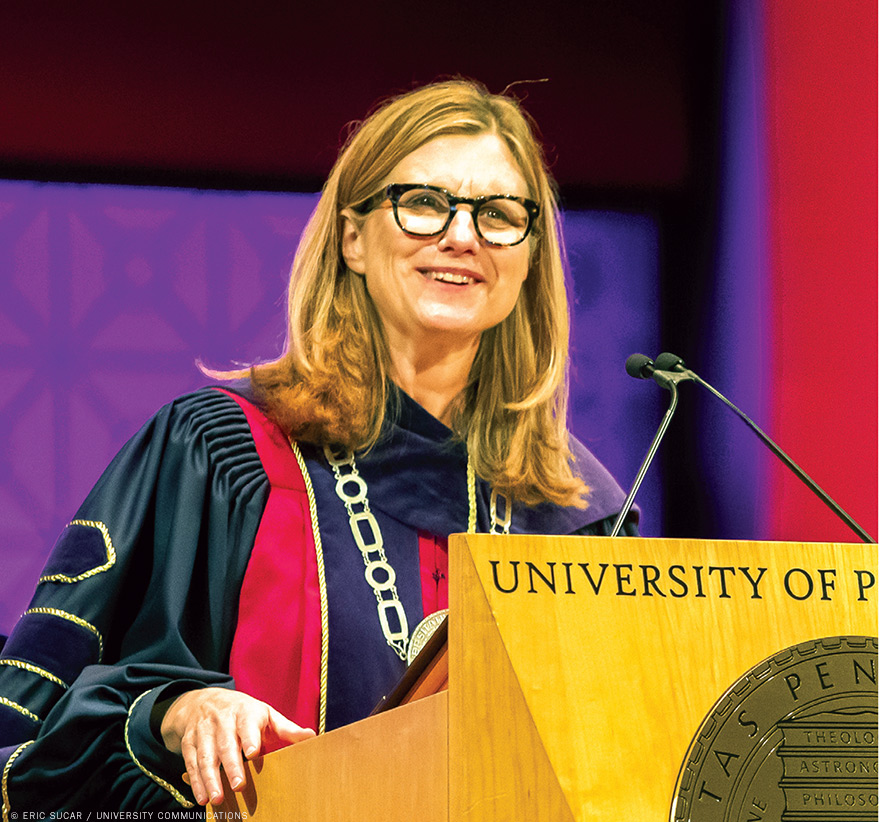
“There’s a wonderful urgency there,” she said. “What do you hear in that phrase? I hear the enterprising spirit of invention that defines this University as much as our founder. I hear restless curiosity and I hear tenacious investigation. More than anything, I hear the call that Franklin answered his whole life: the call to meet the moment and make a better future.”
Penn has continued to answer that call throughout its history, she said. “We are just the latest in a long and celebrated line of individuals who have been given the privilege and the solemn responsibility of determining how Penn will meet this moment. How can the future be made better by what we do in the days to come.
“It is in that sense then that today is not a moment where we gather to celebrate the inauguration of Liz Magill. Today we come together to celebrate Penn.”
Magill then acknowledged her predecessors Rodin and Gutmann as “two giants in the history of this University” whose “leadership utterly transformed Penn to become the globally renowned institution we know it to be today” and Wendell Pritchett Gr’97, “who as interim president steered Penn with a steady hand, upholding our preeminence while supporting a seamless transition.”
Remarking that she was the fourth of six children, who now also have children, Magill thanked her extended family—the “many Magills here in attendance today, and Trousdales and Shines, and not a few Szeptyckis as well, including my husband Leon and our children, Alex and Claire”—along with friends, former teachers, former students, and “even former bosses,” for having come “from near and far, and I am so grateful to have you here today.”
Referencing her childhood in Fargo, North Dakota, “a place that sometimes proudly identifies itself as ‘north of normal,’” she said that the “values of High Plains pragmatism and caring for others had a formative influence in my early life. The fundamental importance of community is at its core. Which is what I see as being so special and potent about Penn and Philadelphia today.”
Magill went on to trace the significance of each of the University’s moves from Arch to Market streets and then across the Schuylkill River to West Philadelphia (“our boldest, our last, and our greatest move”). She also highlighted one move—maybe equally significant—that wasn’t made, when the University did not take up a proposal to relocate out of the city to Valley Forge, first proposed in the 1920s and not formally laid to rest until 1959.
“Our move to Valley Forge would have been a flight away from who we are. Being directly involved in and informed by this great city has always been a catalyst.” The decision to stay, she added, came from “knowing what fuels our vitality and committing to it. At every step and with every brick the university confronted the challenges of the time by declaring, ‘Let the experiment be made,’ not just for us but, in the spirit of our founder, for the good of all.”
In the centuries since Franklin wrote those words, “time and again Penn has met the moment. Today our effect in and on the world has never been greater, and so we must ask: What comes next? What does the world need from Penn?”
The many challenges facing our world include an eroding faith in “the promise of democratic self-government and the usefulness of institutions” and the existential threat of climate change, she said. “We stand on the cusp of revolutionary changes in medicine and health and are only beginning to realize the promise of those discoveries, and too many people lack access.”
Society is “profoundly polarized,” she continued. “Many people no longer believe that knowledge, education, service to others, arts and culture, are the surest path to well-lived and better-lived lives, and we require leaders broadly and deeply learned, service minded, and bearing all of the hallmarks of an excellent education.
“So the challenges are many and the need is great, but here’s my message: in its long and illustrious history Penn has always met the moment. Now and for the future, we will help make the moment. We can be confident enough in our strengths to be bold, to take risks, to play offense, and we can stand tall in our distinctive values and the creativity and tenacity of Penn people.”
Magill likened this effort to “drawing down the lightning”—a phrase, she explained, used by Franklin in a generous response to a Scottish physician who wrote asking about his experiment. “Here is what making the moment, what drawing down the lightning, looks like to me,” Magill said. “It requires the right kite and key. Ours are opportunity and truth.”
Historically, these qualities have been the special province of universities. “At our most fundamental, we seek truth, and we convey it, and at our most aspirational, we enhance opportunity and hone the tools for attaining it,” she said. “Today the very nature of truth is contested and the means to opportunity are fragile. The University of Pennsylvania is called upon to redouble our historic and our forward-looking commitment to these two principles.”
That means “maximizing possibilities for people of all backgrounds, it means increasing fairness, it means strengthening our diversity and our inclusion. Both within Penn and all around,” she said. “It is the sum of all of our efforts through our city, our nation, and the world.”
In its history, Penn has never been more strongly positioned to increase opportunities and empower truth through its teaching, research, and invention, Magill added. “We will do even more to bring together the very best minds with the best resources. We will fuel that signature Penn drive to create and disseminate knowledge, to bring about a better world,” she said. “We welcome a challenge here and we thrive on it. To answer the great challenges of our time, opportunity and truth will be our conductors, our kite and our key, our means to draw down the lightning.”
Magill called “an unblinking focus on the future” the throughline of Franklin’s life and Penn’s history and present. “Franklin sometimes regretted being born too soon, deprived of knowing what would be known 100 years hence,” she said. “We have that impatience, that virtuous impatience, that urgency to put our knowledge and our discoveries to work in order to make a better future for all.
“The reason we’re all here today, really, is for tomorrow. Opportunity, truth, tomorrow. These ideas define our history, our mission, and what Penn can bring to the world. They embody an uncompromising commitment to excellence in all we do while at the same time constantly striving for better in everything we do. That work is ongoing, and it is going to remain unending.
“Today we commit our university and ourselves not only to meeting the moment but to making it. It’s the right thing, it’s the necessary thing, and we are capable of it. What is truly and uniquely Penn? It’s making the experiment, it’s making the moment, it’s drawing down the lightning,” she said. “As Penn’s ninth president I pledge to do everything in my power to support this university, this city, and our people in making the moment. The future awaits but we’re ready. Let’s draw down the lightning—together.”
II. Picnic and Concert on Shoemaker Green

After Magill’s address, the inauguration party joined a bigger, and hungrier, gathering on Shoemaker Green, where Penn faculty, staff, and students formed snaking lines for a smorgasbord picnic highlighted by offerings from the local restaurateur power duo Steven Cook W’95 and Michael Solomonov [“Bistro Days,” Mar|Apr 2008]. Celebrators could tuck into pomegranate lamb shoulder from the James Beard Award–winning Zahav, nibble on chicken sandwiches and fresh-fried mini donuts from Federal Donuts, or opt for pork banh mi sandwiches from the Australia-born, Philly-fledged PaperMill food truck. The 5,000-plus attendees also had the chance to enjoy a variety of beverages in free commemorative tumblers and scoops of a special batch of the “Penn-augural Berry Chocolate Chunk” flavor from the nation’s oldest ice cream company, Bassetts.
In the toasty sunshine, embroidered red flannel blankets—which were given to guests upon their arrival—soon dotted the eastern portion of the lawn, near a bandstand where alt-country icon Jeff Tweedy played an intimate solo set with his acoustic guitar. “I feel like I’m playing at nap time,” the introspective singer, best known for leading the Grammy-winning rock band Wilco, wryly ruminated between searchingly mellow tunes. The energy shifted into a higher gear with the appearance of mid-1990s superstar Sheryl Crow. Taking the stage with a rollicking five-piece backing band, Crow belted out MTV-era hits with a vocal thrust to be coveted by singers who’ve known nothing but YouTube. Like Tweedy, the 60-year-old singer was also self-deprecating (she joked that if anyone knew one of her songs, they must have been shopping at a Home Depot or Whole Foods recently) but also praised Magill and the role of higher education and encouraged everyone in the audience to vote.
Tweedy and Crow were both invited to perform because they’re favorites of Magill, who enjoyed the concert alongside the other attendees. The new Penn president and her husband Leon Szeptycki danced close to the stage, which doubled the following evening as an especially enviable platform for the ninth annual Blutt Band Slam [“Homecoming 2016,” Jan|Feb 2017].
III. Academic Symposium
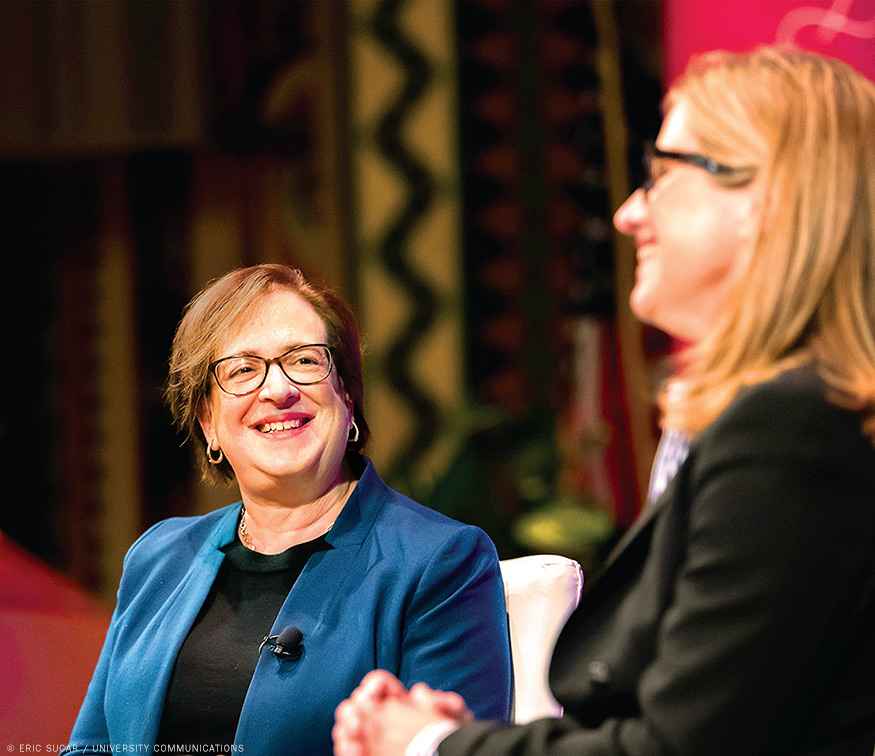
US solicitor general—in conversation with President Magill. Photo by Eric Sucar / University Communications
Why US solicitor general is the best job in law, reflections on being “first” and on campus free speech, and the larger lessons of an obscure patent case involving a “Spider-Man glove” were just a few of the topics covered in the academic symposium featuring Penn President Liz Magill and Supreme Court Justice Elena Kagan that closed out the inauguration festivities.
As Penn’s newly inaugurated president was about to pose her first question to Kagan—about why she chose law as a career—the justice interrupted to share something with the audience inside Irvine Auditorium and watching via livestream.
“[Liz and I] go back a long way,” she said, “and I can tell the entire Penn community they’ve got the real deal here. You’re going to get, I think, a lot of innovative ideas, a lot of good sense, judgment, a lot of integrity all wrapped up in one package, so you’re a lucky university.”
“I hope I can live up to that billing,” said Magill.
“Well, you better.”
Kagan went on to say that she applied to law school for “all the wrong reasons,” as a former undergraduate history major who had rethought getting a PhD. The turn to the law from history was one of several points Kagan has in common with Magill, along with service in government, clerking for iconic figures on the Supreme Court (Kagan with Thurgood Marshall, Magill with Ruth Bader Ginsburg), and serving as dean of leading law schools (Harvard and Stanford, respectively), as Trustee Chair Scott Bok noted in his introduction to the symposium.
“But whatever bad reason took me to law school, I was very lucky,” Kagan continued. “From the very first moment, I loved it. And what I loved about it was that it’s incredibly intellectually stimulating. It’s like a gigantic puzzle if you’re a person who likes analytical sorts of puzzles, but at the same time it makes a real difference in the world.”
A surprising amount of the ensuing discussion revolved around the solicitor general’s office, which represents the US before the Supreme Court and appellate courts. Kagan held the position for a year or so during the Obama administration before being nominated to the Supreme Court in 2010. When Magill asked Kagan to name the best job in law, that was her pick—and, she added, her opinion was shared by Thurgood Marshall, who she called the “greatest lawyer of the 20th century.”
Kagan’s first argument as solicitor general—which was also her first argument before the Supreme Court ever, she emphasized—was Citizens United, which removed restrictions on independent contributions to political campaigns. While she felt the stress of arguing a high-profile case, it was clear how the court was going to rule in the end. “I could have done the greatest job in the world and probably the result would have been the result,” Kagan said, “but I was still pretty nervous.”
She recalled that she only managed to get one sentence out before Justice Antonin Scalia “leaned over the bench and said, ‘Wait! Wait! Wait!’ And then he proceeded to tell me why the single sentence that I had said—which was something about the history of campaign finance regulation in America—was completely wrong,” Kagan said.
She and Scalia, who was a Harvard law alumnus, had gotten to know each other when she was dean “and we had a very good relationship,” she said. “I’m quite convinced that he did it just to get me in the game. It was like this moment of, the voice is a little bit shaky, and I’m standing up here and what do I do now? Now I have to remember the second sentence that I memorized. It just got me in the game.”
Magill asked about Kagan’s hunting trip with Scalia after she joined the court, which she said arose from a promise she made to a senator skeptical of her Second Amendment views—“the only promise I made in 82 office visits” during the nomination process—and which Scalia thought was “the funniest thing in the world.” Before Scalia’s death they went bird shooting in Virginia a few times a year, she said, and once went duck hunting in Mississippi, “which was great,” but she didn’t care for an excursion hunting game in Wyoming. “I said no more of that.”
In one exchange—nominally about a patent dispute Kagan referred to as “my Spider-Man opinion,” but with implications for last summer’s Dobbs decision that were hard to miss—Kagan offered an eloquent defense of the doctrine of stare decisis and of incremental lawmaking. The case, Kimble v. Marvel Entertainment, involved a glove that shot webs—occasioning “no end of clerk shenanigans” in her chambers—in which the court upheld an old patent doctrine that almost certainly would not have been devised in 2015 (when the case was decided), “because the doctrine of precedent was of great importance in our law,” Kagan said.
She told Magill that Scalia, as senior judge in the majority, had assigned her to write the opinion. “He said, ‘I think that this is a great opinion for you to write, Elena, because it’s kind of a statement opinion. There are not so many opportunities you get around here as a junior justice’—and this was like maybe my third year—‘to really say how you think about the doing of law and the business of judging,’” she recalled. “It’s an opinion I’ve gone back to, and I’ve cited a lot of times over the years, and I continue to think about why it is that this doctrine is so important. You want to know why?”
“Yes, I do. I think all of us do,” said Magill, which the audience confirmed with applause.
“The first reason is that law should be stable. People depend on the law; people rely on law. You give them a legal rule and they order their life, and they order their conduct and that’s true of things that are economic transactions and it’s true of non-economic” matters too, she said. If “you give people a right and then you take that right away, well, in the meantime they’ve understood their lives in a different kind of way.
“So, laws should be stable, and judges should be humble. Stare decisis is a doctrine of stability, but it’s also a doctrine of humility,” she added.
“The way law develops best is when it develops slowly and incrementally by the work of many judges over time, and it’s a kind of hubris to say we’re just throwing that all out because we think we know better,” she said. “So this is a doctrine that sort of forces judges to be humble.
Morover, she went on, “it prevents the court from becoming politicized, and again this is something that people have been talking about—not just me and Spider-Man—but people have been talking a long time about why do we have this doctrine?”
While it seems “counterintuitive” for a judge to preserve a doctrine they think is wrong, “if you have judges and they come on to a court and they say ‘We’re sort of overthrowing the apparatus and we’re overthrowing legal rules,’ it starts not to look like law anymore,” she said. “Maybe some other justices will come out and they’ll do the same thing.”
As a result, instead of the law building over time, “there are all these jolts to the system, and it begins to look not like a court and more like a political institution. And that’s something that the courts need to be incredibly cognizant of and wary about,” she said.
Kagan drew a distinction between “ordinary dissents” in which justices have simple differences of opinion on interpreting a law, and “the kinds of dissents that you speak from the bench, the kind where you think something very important is at stake,” she said. “You realize there are going to be other cases coming down the pike which are going to involve similar issues … and you’re going to approach it from a different vantage point than the majority does and that’s going to continue to be the case. You want almost to give notice of that, and at the same time to speak to the future and to say, ‘This court has made a decision, but there are various ways to remedy or to limit or to cabin mistakes, and we should be looking to do that and to give people some guidance or give people some hope that that might happen.’”
With precedent-defying decisions involving environmental protection and gun rights, in addition to Dobbs, during the Supreme Court’s session last year, Magill asked whether Kagan considered herself the “dissenter on the court.” “You hope that you don’t have to think of yourself that way,” the justice said. “Last year I thought of myself that way for sure, but I think it would be a really bad thing if that was just what the court is going to be like.
“I like to think of myself as a clear-eyed optimist—I’m clear eyed about the challenges and the difficulties but still remain hopeful,” she added. “But time will tell whether this is a court that can get back to trying to find common ground, to ratcheting down the level of decision-making so that we can reach compromises.” If not, “I will spend a lot of my time dissenting.”
When Magill asked Kagan for her thoughts on being Harvard Law School’s first female dean, Kagan said it didn’t have much resonance since there was already a woman at the helm of a major law school (Kathleen Sullivan at Stanford). But it turned out, she learned, that it meant a lot to women graduates of Harvard Law.
Magill also asked for her thoughts on campus free speech. “My theory was you should be able to have people feel that they’re being respected, and you should also be able to have really vibrant, robust debate and both of those things are important,” Kagan said. “There are not many ideas that you can’t convey in a respectful way, and indeed if you’re trying to persuade somebody, it’s better to convey them in a respectful [way] than in a way that hurts people or offends people.”
At the same time, “it’s just really important for people to feel free to express their views,” adding that there’s “nothing worse” in a classroom than when people are silent out of fear of being misconstrued. “When that kind of thing happens, nobody’s learning from each other.”
On the rarity of non-judges ascending to the bench—she was the first since William Rehnquist and Lewis Powell in 1971—Kagan said it’s “probably because people are more focused on [knowing] exactly what kind of justice you’re going to be, and the best way to think about that is to see what kind of judge you were. I’m not sure it says anything great about the nomination and confirmation process that it’s moved in that direction, but it has.”
Backgrounds of all kinds are possible, but Kagan put forward her old job of solicitor general as “pretty much the best preparation” for service on the Supreme Court. “I used to think, my job last year was to persuade nine Supreme Court justices and my job this year is to persuade eight Supreme Court justices—and it’s not all that different.”
In a “lightning round” towards the end of the discussion, Magill asked Kagan what other thing she might like to be, if not a Supreme Court justice—or solicitor general. After mulling the question, Kagan replied, “How is it being a university president?”
“It’s a great gig,” Magill said. “I recommend it.”



